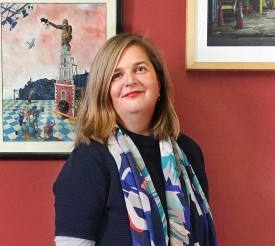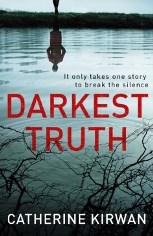
Long before I became a writer, I was
a reader. Before I became a reader, I was a listener, a listener to adults’
conversations and to stories. Not bedtime stories in the conventional sense,
though it was in my grandmother’s bed I heard them often.
There was nothing soothing about the
stories she told of a perilous train and boat journey from London home to
Ireland at the outbreak of World War Two; of the death of her mother when my
grandmother was only three; of pishogues and superstitions and fairy trees; of
evil. And, my favourite, the one about the bull - a quiet walk through the
fields to pick mushrooms gone horribly wrong - a tale of suspense, terror,
daring and miraculous escape when all seemed lost, a story told and retold and
stripped back and redrafted and re-embellished.
I think I was aware even at the time
that she was making it up. That was half the thrill, knowing that the story
could twist and change but still have certain guaranteed elements that would
never fail to satisfy. It was my first lesson in crime-writing.
I grew up on a farm in County
Waterford in the 1970’s and early 1980’s. There are eleven houses on the mile
of road near our house now, but back then there was only one apart from ours, a
cottage hidden behind thick ivy and tangled roses.
A lovely man called Neddy lived
there. He walked and cycled everywhere and left his single cow to roam what was
called the ‘long acre’, grazing the roadside verges. He brought a
freshly-caught salmon wrapped in newspaper to my mother sometimes. He told
stories of things seen in the moonless dark, mysterious happenings,
inexplicable unless you believed in ghosts and fairies but logical if you did.
He told riddles too, ‘riddle me this’ he began always, though I never could.
And he told Columbo. The day after the latest episode was shown, he would come
down to the house to discuss it. In order to give particular emphasis to
certain points, he would act out the crucial scene, taking the main role,
scratching his head, puzzled, just like Peter Falk.
I recall him once using our
sitting-room door to demonstrate how the detective would lull the suspect into
a false sense of security and how he would leave a room and come back several
times before asking the final killer question.
Neddy always had his own take on
what had happened. ‘I make out,’ he would start, as he sketched out his version
of Columbo’s thought processes or the villain’s grievous errors, picking up on
something I hadn’t noticed or placing a different interpretation on something I
had. That was my second lesson in crime-writing: the reader completes the
story.
After my mother taught me to read, I
worked my way through every book in our house. Children’s books, including some
that my mother had had as a child. Encyclopaedias. Thrillers. Classics.
Anything. Ian Fleming and Walter Macken. Only one Agatha Christie. I liked it
and got more from the school library and read every other book there too. I’ve
never stopped reading but I’ve read more crime, thriller and spy fiction than
anything else.
Some writers I return to again and
again. A librarian told me recently that she’d follow Kate Atkinson anywhere.
It got me thinking about the strange chemistry that happens between readers and
writers. I’m still thinking about it and I’m not sure I can explain it.
John Connolly, the creator of the
extraordinary Charlie Parker series, says that all crime plots are much the
same but that people come back for the characters. Liz Nugent, author of the
fabulous Skin Deep, says that if you
get your characters right, you don’t have to worry about plot, that they will
do the work for you. I agree with both of them.
And yet I think there’s more to it
than that. A large part of the reason I return to the writers I love is because
of the way they write. That’s my third lesson in crime-writing: the story must
be good, but it must also be well told.
The mystery is that what ‘well told’
means seems to vary from reader to reader, the way we’re drawn to some singers
and musicians more than others. It’s about style, but not only about style.
It’s deeper, something to do with how the reader hears the writer’s voice. It
all comes back to the listening, our first sense and, so they say, our last.
About Darkest Truth

Darkest Truth opens as Cork solicitor Finn Fitzpatrick leaves work for the
weekend. On the street outside her office, she’s stopped by a man who tells her
that, fifteen years before, his daughter was abused by Ireland’s most
successful film director, the much-loved Jeremy Gill. But the man’s daughter,
the only witness, is dead. And there’s no evidence against Gill - unless Finn
can find it. The more she investigates, the darker
and more twisted the picture becomes. Soon Finn herself is in danger. Because
these are powerful people she is trying to expose. And they are willing to do
anything to protect their secrets.
Published by Arrow (July 11, 2019) Pbk £8.99